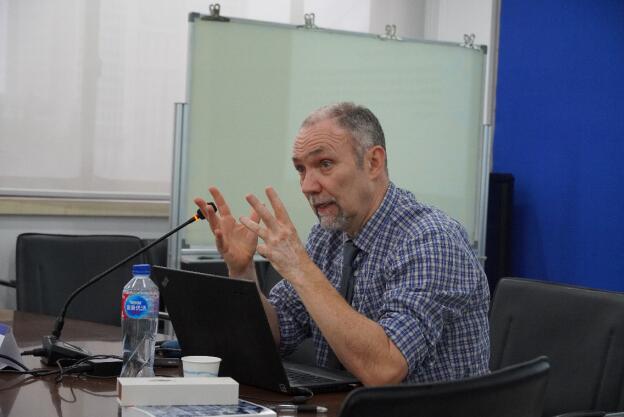Events



On October 22nd, 2021, the 18th lecture of the Fudan-LSE lecture series was successfully held in Room 615 of Wenke Building at Fudan University. Tim Pringle, Editor-in-Chief of The China Quarterly, delivered a lecture on “Trade Unions in Transition: From Command to Market Economies”. The lecture was organized by the Institute for Global Public Policy (IGPP) of Fudan University and chaired by Professor Yijia Jing, Dean of IGPP.
Professor Pringle has been the editor of The China Quarterly since January 2017. He has also been a senior lecturer at the School of Oriental and African Studies (SOAS) since 2012, after receiving his Ph.D. in sociology from the University of Warwick. Professor Pringle began by introducing his new book titled Trade Unions in Transition: From Command to Market Economies. The book was co-authored by sixteen scholars from ten countries and took three years to accomplish.

In his lecture, Professor Pringle firstly set out the background of this book. With the shift from “iron rice bowls” to the time-bound employment contract, from state welfare to social insurance, as well as the large-scale layoff and privatization of state-owned enterprises, socialist countries such as China and Vietnam went through the transition to a market-based labour relation in the late Cold War.Meanwhile, these factors lead to the transformation of trade unions in socialist and post-socialist countries along with the increasing trend of neoliberalism around the globe.
According to Professor Pringle, major social transformations often involve changes in the social relations, which further produce value. Labour relations lie at the core of social relations. During the transformation from the command economy to the market economy, while the context, speed and spatial limits of transformations vary among countries, all the workers are by no means passive.

Professor Pringle went on to raise another question: Why should we study the trade unions? He argued that workers and the working class are the main components of trade unions. Through collective actions, trade unions have the potential to have a significant impact on the process of transformation and development. However, in this process, trade unions themselves will also change to a greater or lesser extent, so that the transformation is in fact a two-way process. Therefore, the premise of this research is that the key to understanding the ever-changing social relations is to figure out how trade unions have adapted to the opposing interests inherent in the market-based labour relations following the reform of the planned economy. Professor Pringle compared the functions of trade unions in planned and market economies, from which he concluded with the myth of a double transition: that the double transformation was not born in practice, that history did not end as Fukuyama predicted, that Marx’s theory still has explanatory power and that social democracy itself has undergone changes. He also cited different transformations in several countries, explained the four dimensions of analysis, including trade unions and the state, internal governance, economic role, and conciliation and conflict, and offered a comparative study using Vietnam as an example.
At the end of the lecture, Professor Pringle interacted with students and faculty members, engaging in a series of discussions on specific issues related to this topic.